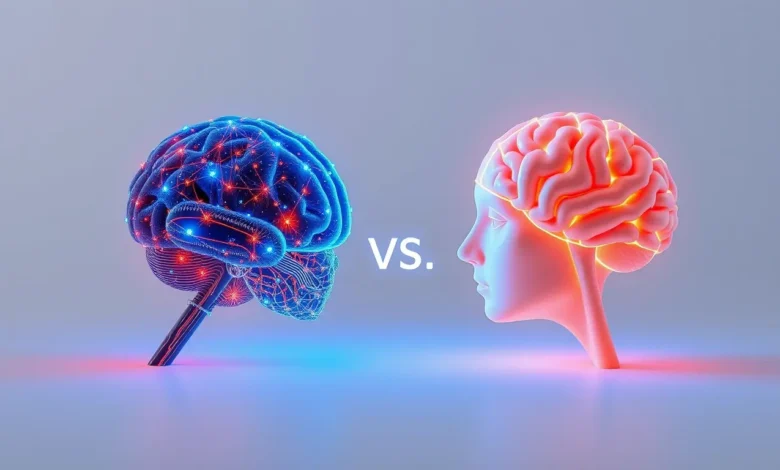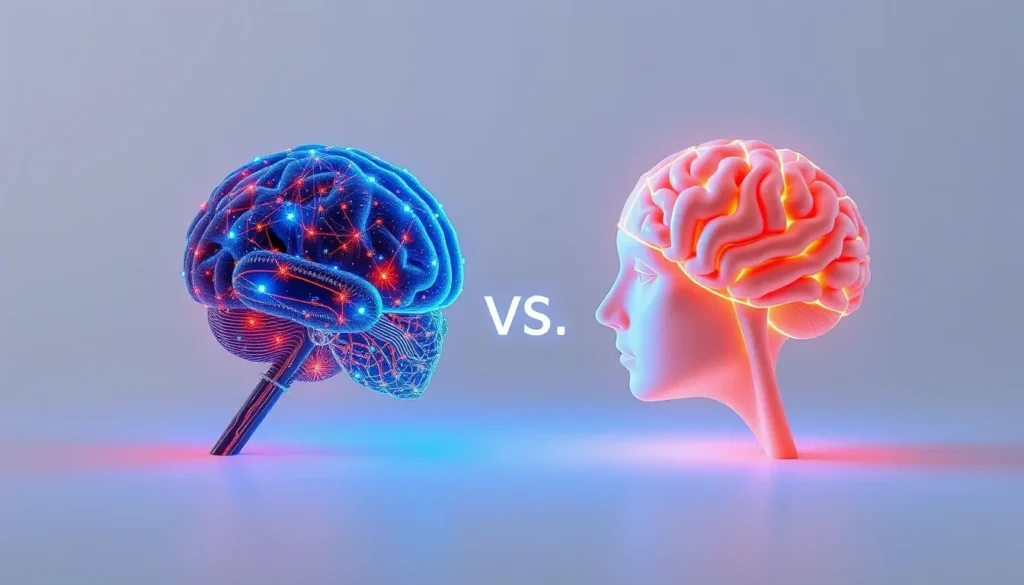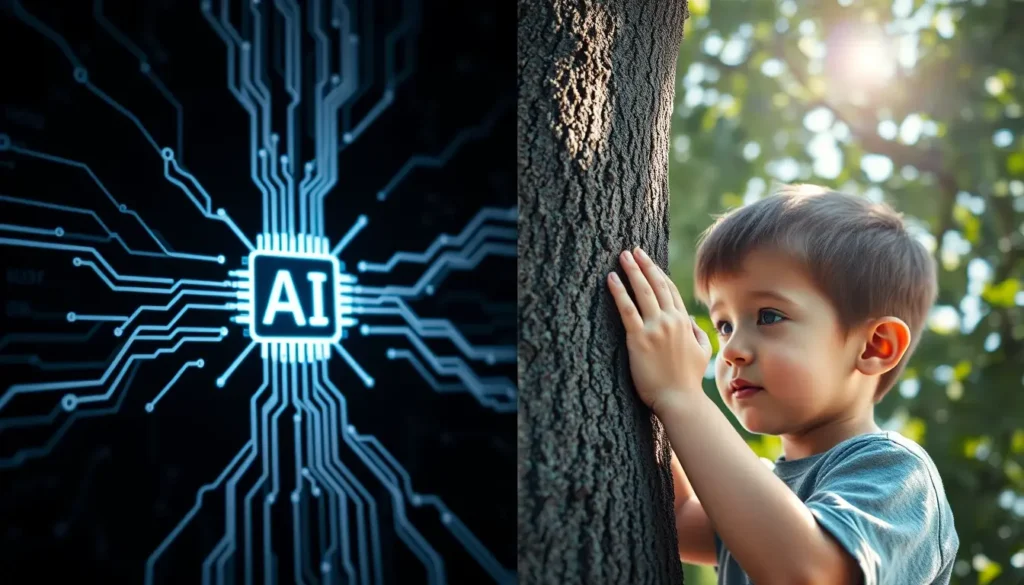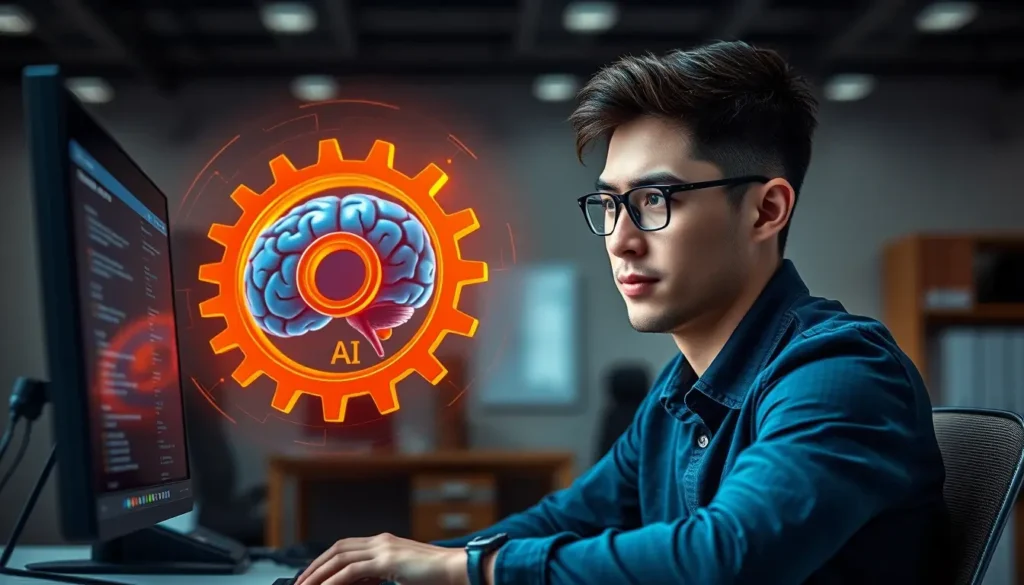
It feels like the ultimate showdown: the raw, biological power of the human brain against the lightning-fast processing of a massive AI. In the great debate of ChatGPT vs Brain, we’re all asking the same questions. Is this technology smarter than us? Is it going to make us lazy? Is using ChatGPT actually rotting our brains?

The internet is full of technical comparisons, but let’s be honest that doesn’t help much. To really understand the difference, we need a simpler way to think about it.
So, let’s reframe the entire ChatGPT vs Brain comparison with a simple analogy. Think of ChatGPT as the most incredible library in the universe, and your brain as a wise, world-class chef. The library has read every recipe, but the chef knows how to cook. This simple metaphor is the key to settling the ChatGPT vs Brain debate. One is a master of information, the other is a master of understanding.
Human Brain vs AI: A Tale of the Tape
Before we dive deeper, let’s get a clear, scannable overview. The core differences in the ChatGPT vs Brain matchup are vast. One isn’t just a better version of the other; they are fundamentally different kinds of intelligence.
Tale of the Tape
Information Retrieval
Understanding & Creation
Blazingly Fast (Processes entire libraries in seconds)
Relatively Slow (Needs time to think and reflect)
Massive (Requires data centers and huge power)
Incredibly Efficient (Runs on a dim lightbulb’s power)
None. It’s a pattern-matching machine.
The foundation of how it navigates the world.
Can remix existing patterns in novel ways.
Can generate truly original, novel ideas from scratch.
How Do They “Learn”? The Biggest Misconception
The word “learning” is where things get confusing in the ChatGPT vs Brain discussion. The way ChatGPT “learns” is fundamentally different from how you do. It’s crucial to understand how does ChatGPT work at a basic level to see this difference.
Two Very Different Ways of Learning
🤖ChatGPT
🧠Your Brain
Your brain learns through experience, emotion, and physical interaction with the world—what scientists call embodied cognition. This is a key advantage in the human brain vs AI comparison. ChatGPT learns by finding mathematical patterns in text using its neural networks. This is why you can learn to ride a bike, but ChatGPT can only describe the physics of it. One is knowledge, the other is true understanding.
The “Brain Rot” Question: A Look at Cognitive Offloading
This is the biggest fear, fueled by headlines claiming that AI will “rot your brain.” The truth, as researchers at MIT and other institutions have found, is a little more complicated. Using ChatGPT is a form of cognitive offloading you are handing a mental task over to a machine.

But we do this all the time. Using a calculator for math or a GPS for directions is also cognitive offloading. The real question isn’t “Does it rot your brain?” but “What are you doing with the mental energy you’ve saved?” The impact of the ChatGPT vs Brain dynamic in your own life depends entirely on how you use the tool.
The Spectrum of AI Use
Where do you fall on the spectrum?
Using AI to simply copy an answer falls on the red side, weakening your thinking skills. Using it to brainstorm ideas, debate a topic, or summarize research falls on the green side, freeing up your brain for higher-level work.
If you offload the boring task of summarizing an article so you can spend more time debating its ideas, you are making your brain stronger. If you offload writing an entire essay and watch TV instead, you are making it weaker. The choice, and the outcome, is yours. This is a central theme in our guide on Ethical AI Guidelines.
The Unfair Advantages: Where Each One Dominates
In the matchup of ChatGPT vs Brain, each competitor has abilities that the other simply cannot replicate. It’s not about who is “smarter” overall, but who is better at a specific task. Understanding these unique strengths is key to using AI effectively.
The Unfair Advantages
ChatGPT’s Edge
Perfect Recall: It has flawless memory of a vast library of information.
Raw Speed: It can read, summarize, and structure information instantly.
Scale: It can perform its tasks on a massive scale without getting tired.
The Brain’s Edge
True Understanding: It knows the “why” behind the facts, not just the patterns.
Original Creativity: It can create truly novel ideas and art from experience.
Consciousness: It has experiences, emotions, and a sense of self.
As you can see, the strengths are complementary. The power of ChatGPT is in its boundless access to information, while the power of the human brain lies in its boundless ability to create something truly new from that information. This dynamic is changing AI and learning forever.
The Partnership Model: The Real Winner
So, in the matchup of ChatGPT vs Brain, who wins? Neither.

The real winner is the partnership. Researchers call this the “centaur” model. A human paired with the right AI tool is smarter, faster, and more creative than either one alone. You, the chef, can use the library to instantly find a recipe for a rare ingredient. Then, you can use your human experience and creativity to adapt that recipe and create something entirely new. That is the true potential of this technology.
Conclusion
The debate over ChatGPT vs Brain was never a fair fight, because they were never in the same competition. ChatGPT is an incredible tool for accessing and structuring information. Your brain is a masterpiece of understanding, creativity, and consciousness. The technology is not a rival to be feared, but a powerful assistant to be leveraged. By understanding its limitations, we can better appreciate our own incredible strengths and use this tool not to replace our thinking, but to amplify it.
Was this guide helpful?
Frequently Asked Questions
In the ChatGPT vs Brain comparison, which is faster?
ChatGPT is astronomically faster at processing text-based information. However, the human brain is much faster at adapting to new, real-world situations it has never seen before.
Does using ChatGPT lower your intelligence?
No, not inherently. It’s a tool, and its impact depends on how you use it. Using it to replace thinking can weaken skills, but using it to amplify thinking can make you more effective.
What’s the biggest thing the human brain can do that ChatGPT can’t?
The brain can truly understand context, have original ideas, and feel emotions. It possesses consciousness and common sense, which AI currently lacks entirely.
How is an AI’s “neural network” different from the brain’s?
AI neural networks are a mathematical inspiration, but vastly simpler. The human brain has trillions of complex, living connections, while AI networks are layers of digital calculations.
Will AI ever be as “smart” as a human brain?
AI may surpass human ability in specific tasks (like data analysis or games), but achieving the brain’s general intelligence, creativity, and consciousness is a far more complex and distant challenge.
What is “cognitive offloading”?
It’s the act of handing a mental task over to a tool, like using a calculator for math or GPS for directions. Using ChatGPT to summarize a long document is a modern form of this.
Why is the human brain so much more energy-efficient?
The brain is a masterpiece of biological evolution, perfected over millions of years to run on very little power. Data centers that run large AI models require massive amounts of electricity.
What’s the best way to use ChatGPT with my brain?
Use it as a partner. Let ChatGPT handle the heavy lifting of data retrieval and summarization, which frees up your brain to do what it does best: think critically, ask questions, and create something new.
